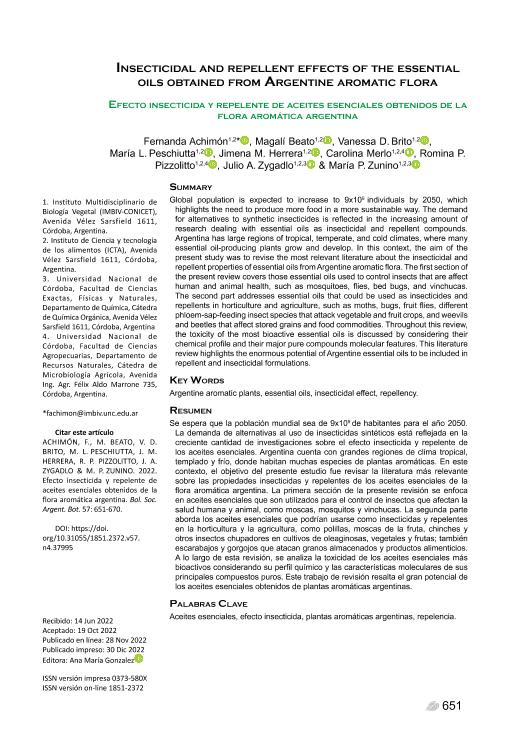Artículo
Se espera que la población mundial sea de 9x109 de habitantes para el año 2050. La demanda de alternativas al uso de insecticidas sintéticos está reflejada en la creciente cantidad de investigaciones sobre el efecto insecticida y repelente de los aceites esenciales. Argentina cuenta con grandes regiones de clima tropical, templado y frío, donde habitan muchas especies de plantas aromáticas. En este contexto, el objetivo del presente estudio fue revisar la literatura más relevante sobre las propiedades insecticidas y repelentes de los aceites esenciales de la flora aromática argentina. La primera sección de la presente revisión se enfoca en aceites esenciales que son utilizados para el control de insectos que afectan la salud humana y animal, como moscas, mosquitos y vinchucas. La segunda parte aborda los aceites esenciales que podrían usarse como insecticidas y repelentes en la horticultura y la agricultura, como polillas, moscas de la fruta, chinches y otros insectos chupadores en cultivos de oleaginosas, vegetales y frutas; también escarabajos y gorgojos que atacan granos almacenados y productos alimenticios. A lo largo de esta revisión, se analiza la toxicidad de los aceites esenciales más bioactivos considerando su perfil químico y las características moleculares de sus principales compuestos puros. Este trabajo de revisión resalta el gran potencial de los aceites esenciales obtenidos de plantas aromáticas argentinas. Global population is expected to increase to 9x109 individuals by 2050, which highlights the need to produce more food in a more sustainable way. The demand for alternatives to synthetic insecticides is reflected in the increasing amount of research dealing with essential oils as insecticidal and repellent compounds. Argentina has large regions of tropical, temperate, and cold climates, where many essential oil-producing plants grow and develop. In this context, the aim of the present study was to revise the most relevant literature about the insecticidal and repellent properties of essential oils from Argentine aromatic flora. The first section of the present review covers those essential oils used to control insects that are affect human and animal health, such as mosquitoes, flies, bed bugs, and vinchucas. The second part addresses essential oils that could be used as insecticides and repellents in horticulture and agriculture, such as moths, bugs, fruit flies, different phloem-sap-feeding insect species that attack vegetable and fruit crops, and weevils and beetles that affect stored grains and food commodities. Throughout this review, the toxicity of the most bioactive essential oils is discussed by considering their chemical profile and their major pure compounds molecular features. This literature review highlights the enormous potential of Argentine essential oils to be included in repellent and insecticidal formulations.
Efecto insecticida y repelente de aceites esenciales (AEs) obtenidos de la flora aromática argentina
Título:
Insecticidal and repellent effects of the essential oils obtained from Argentine aromatic flora
Achimón, Fernanda ; Beato, Magalí; Brito, Vanessa Daniela
; Beato, Magalí; Brito, Vanessa Daniela ; Peschiutta, María Laura
; Peschiutta, María Laura ; Herrera, Jimena María
; Herrera, Jimena María ; Merlo, Carolina
; Merlo, Carolina ; Pizzolitto, Romina Paola
; Pizzolitto, Romina Paola ; Zygadlo, Julio Alberto
; Zygadlo, Julio Alberto ; Zunino, María Paula
; Zunino, María Paula
 ; Beato, Magalí; Brito, Vanessa Daniela
; Beato, Magalí; Brito, Vanessa Daniela ; Peschiutta, María Laura
; Peschiutta, María Laura ; Herrera, Jimena María
; Herrera, Jimena María ; Merlo, Carolina
; Merlo, Carolina ; Pizzolitto, Romina Paola
; Pizzolitto, Romina Paola ; Zygadlo, Julio Alberto
; Zygadlo, Julio Alberto ; Zunino, María Paula
; Zunino, María Paula
Fecha de publicación:
11/2022
Editorial:
Sociedad Argentina de Botánica
Revista:
Boletín de la Sociedad Argentina de Botánica
ISSN:
0373-580X
e-ISSN:
1851-2372
Idioma:
Inglés
Tipo de recurso:
Artículo publicado
Clasificación temática:
Resumen
Archivos asociados
Licencia
Identificadores
Colecciones
Articulos(IMBIV)
Articulos de INST.MULTIDISCIPL.DE BIOLOGIA VEGETAL (P)
Articulos de INST.MULTIDISCIPL.DE BIOLOGIA VEGETAL (P)
Citación
Achimón, Fernanda; Beato, Magalí; Brito, Vanessa Daniela; Peschiutta, María Laura; Herrera, Jimena María; et al.; Efecto insecticida y repelente de aceites esenciales (AEs) obtenidos de la flora aromática argentina; Sociedad Argentina de Botánica; Boletín de la Sociedad Argentina de Botánica; 57; 4; 11-2022; 651-670
Compartir
Altmétricas



